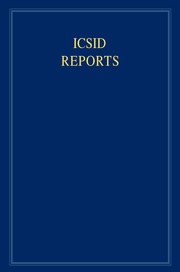Article contents
Nykomb Synergetics Technology Holding AB v. Republic of Latvia
Published online by Cambridge University Press: 01 January 2021
Abstract
Arbitration — Award — Energy Charter Treaty, 1994 (“Treaty”) — Foreign investment — Claimant investing in Latvia through its subsidiary — Latvian energy policy — Latvian law providing for payment of double tariff — Contract between subsidiary and State organ — Change of domestic law — Whether subsidiary having statutory and contractually established right to double tariff — Whether Latvian courts having exclusive jurisdiction over dispute — Claimant claiming for non-payment of double tariff — Claimant alleging breach of obligations under Treaty by Respondent — Whether Respondent liable under Treaty for losses or damages incurred by Claimant
Jurisdiction — Energy Charter Treaty, 1994, Article 26 — Whether Tribunal having jurisdiction to hear claims — Whether Claimant investor’s claims directly related to an investment — Whether Claimant investor having cause of action under Treaty distinct from its subsidiary — Whether Respondent in breach of obligations under Treaty — Whether obligation under Treaty or international law to exhaust local remedies before requesting arbitration
Foreign investment — Environmental character — Claimant’s claims — State responsibility — Whether Respondent liable for Claimant’s claims — Whether non-payment caused directly by State or State organ — Whether action of State organ attributable to State — Whether non-payment constituting violation of obligation under Part III of Energy Charter Treaty — Whether non-payment of double tariff causing loss or damage to Claimant’s investment
Treaties — Energy Charter Treaty, 1994 — Whether violations of obligations under Part III of Treaty — Expropriation — Treaty Article 13 — Whether discriminatory measure — Treaty Article 10(1) — Applicability — Whether any limitations on scope of treaty provisions
Expropriation — Energy Charter Treaty, Article 13 — Indirect or “creeping” expropriation — Whether “regulatory takings” amounting to expropriation or equivalent of expropriation — Whether degree of possession taking sufficient to amount to expropriation or its equivalent
Discrimination — Energy Charter Treaty, Article 10 — Whether fair and equitable treatment afforded to Claimant’s investment — Evaluation by comparing “like with like” — Whether Claimant’s investment afforded same treatment as other comparable companies — Onus on Respondent to satisfy burden of proof
Damages — Legal principles of assessment — Compensating losses for violations of Energy Charter Treaty, Article 10 — Whether Treaty Article 13(1) principles applicable — Established principles of customary international law — International Law Commission’s Draft Articles on State Responsibility, Articles 34 and 35 — Whether restitution an appropriate remedy — Assessment of losses or damages by the Claimant — Payment of interest
Damages — Calculation of damages — Quantification of damages where insufficient or limited documentation submitted — Assessment on international law principles of causation, foreseeability and reasonableness — Basis for assessment
Interest — Energy Charter Treaty, Article 26(8) — Whether Claimant can claim contractual rates of interest — Interest under Treaty awarded as compensation related to Claimant’s compensation for losses
Costs — Rules of the Arbitration Institute of the Stockholm Chamber of Commerce, Article 41 — Payment by losing party of other party’s costs — Apportionment of costs — Whether losing party must compensate where other party’s costs excessive
Keywords
- Type
- Case Report
- Information
- Copyright
- © Cambridge University Press 2007
- 1
- Cited by


